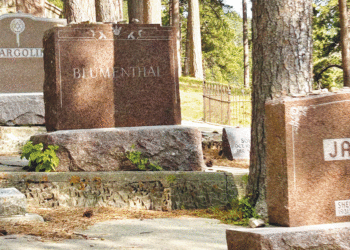At our Passover seders next Wednesday, we will tell the story of the Israelites’ escape from bondage in Egypt and the birth of the Jewish nation. And in our tradition, we do not tell the story as something that happened 3,000 years ago, but rather in the present tense, as if we are the ones emerging from slavery and tasting the fruits of freedom.
More than any other Jewish observance, Passover has been embraced by non-Jews, in this land and abroad, who are struggling for their liberation from the forces of repression. For example, contemporary Haggadot include the singing of “Go Down, Moses,” the African American spiritual that celebrates how the hand of God, and the leadership of Moses, freed the Jewish slaves. (“We need not always weep and mourn,”¨ Let my people go/And wear these slavery chains forlorn,”¨ Let my people go.”)
Of course, we do not emerge from the Land of the Pharaohs merely to indulge in irresponsible hedonism. With freedom comes responsibility — and, after Moses’ journey up Mount Sinai, 613 commandments for Jews to follow. What do we do with our religious and cultural inheritance?
We read in the Haggada that “if God had not brought our ancestors out of Egypt, then we, our children, and our children’s children would still be slaves to Pharaoh in Egypt.” Reflecting on this “strange statement,” Shoah survivor and Nobel laureate Elie Wiesel has commented, in A Passover Haggadah: “The Pharaoh has long ceased to exist. How could we still be his slaves? Clearly, this sentence is allegorical. Pharoahs are not necessarily Egyptian. And Egypt is not the only place where exile is felt. Each generation has its own enemies, it own struggles and — sometimes — its own victories. We evoke Exodus not only to remember our suffering in Egypt, but also to relive the manner in which we overcame our suffering.”
Which leads to the question: Who are the Pharaohs today? Who are the oppressors? What keeps us from being fully human and reaching out to one another?
In the current global economic crisis, some commentators note that there may be unrecognized benefits as the wheels of industry slowly spin down. This week’s Time magazine cover story proclaims: “The End of Excess: Is This Crisis Good for America?” The author traces the recent American joyride to the early ’80s, the beginning of the Reagan presidency and “Wall Street’s great modern bull market.” It was quite a run, but as Time notes, “now everything really has changed. More than a year into the Great Recession, we still aren’t sure if there’s a bottom in sight, and six months after the financial system began imploding, it’s still iffy. The party is finally, definitely over.”
So, perhaps we have to confront the Pharaoh of complacency. We have tended to recede into our private lives, hoping that the inequities that plague our world will not intrude on the realm of comfort we have constructed. We have built a cozy little mitzrayim, an Egypt of obliviousness; but the world is intruding. More is demanded of each of us in these critical times.
Our neighbors have lost their jobs; they are facing eviction. Our nation is at war and challenged from many quarters; Israel has waged its second indecisive war in a period of three years, and a fragile governing coalition has been sworn in. And the Earth faces a looming cataclysm from the buildup of greenhouse gases and the warming of the oceans. There should be plenty to talk about at the seder table.
The editors and staff of the American Jewish World wish all of our readers a happy and meaningful Passover.
(American Jewish World, 4.3.09)



















